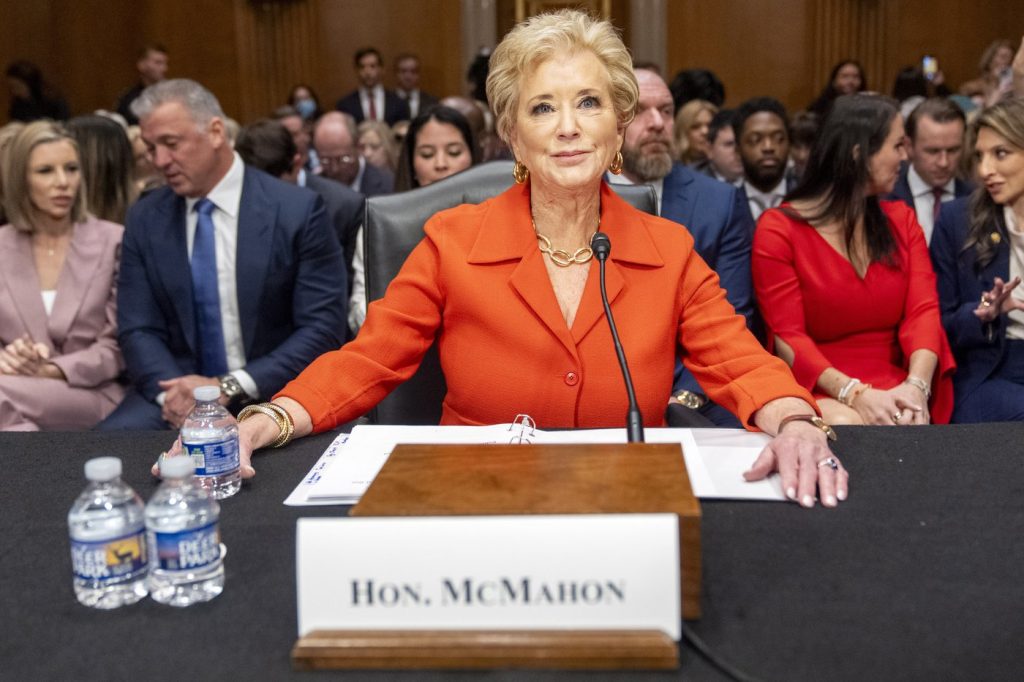As the Trump administration progresses with plans to dismantle the Education Department, officials are contemplating transferring its key functions to other government agencies. This includes civil rights enforcement being handled by the Justice Department, oversight of student loans potentially going to the Treasury or Commerce, and responsibilities concerning student disability rights shifting to the Health and Human Services. However, the future of the department’s mission to promote equal access for students in an inherently unequal education system remains uncertain.
The Education Department has significantly reduced its workforce, with a recent announcement of a layoff affecting 1,300 employees. President Donald Trump, during his campaign, pledged to eliminate the department altogether, deeming it a source of waste and claiming it is "infiltrated by leftists." Advocates for education fear that the absence of the department will lead to inadequate protections for low-income students, English language learners, students with disabilities, and racial and ethnic minorities.
Weadé James, senior director of K-12 education policy for the Center for American Progress, an organization advocating for racial equity in education, expressed concerns about the potential consequences of dismantling an agency tasked with ensuring equal access to education. The Education Department, established in 1980, was partly created in response to the civil rights and anti-poverty movements of the 1960s and 1970s. The act founding the department emphasized its mission to "strengthen the Federal commitment to ensuring access to equal educational opportunity for every individual."
Observers like Michael Petrilli, president of the Thomas B. Fordham Institute, question whether the department’s significant budget cuts or total elimination will have an observable effect. He notes that students are still struggling academically, as evidenced by national test scores indicating that one-third of eighth graders lack fundamental reading skills. This situation is often cited by McMahon and Trump supporters as a justification for reducing the department's size and reallocating its funds directly to states.
Despite its flaws, the Education Department has historically served as a "north star" for American schools, establishing essential standards and protections aimed at achieving equitable outcomes for students, according to Wil Del Pilar, senior vice president of EdTrust. Trump’s vision involves reverting control of education back to state governments. This raises critical questions regarding the allocation of billions of federal dollars annually, such as Title I funding, designed to support schools in high-poverty areas.
Educating underserved populations often incurs additional costs due to the need for specialized resources and smaller class sizes. Districts in economically disadvantaged areas typically struggle to meet these needs, a reality acknowledged by Congress through authorized funding. McMahon has suggested channeling these funds directly to states with fewer restrictions. Critics warn that absent federal oversight, states might prioritize their agendas, exacerbating existing inequalities in education funding.
States such as Mississippi, South Dakota, Arkansas, Montana, and Alaska may be disproportionately affected if oversight rules for state spending are modified. During the 2021-2022 school year, these states relied on federal aid for at least 20% of their school funding. The Office for Civil Rights in the Education Department has traditionally advocated for disadvantaged students, focusing on defending the rights of students with disabilities and those facing racial harassment. Under Trump, the agency has shifted its focus, prioritizing allegations of antisemitism instead.
Some advocates have raised concerns over this shift in priorities, while attorneys indicate a lack of faith in the Office for Civil Rights’ capacity to adequately serve students’ needs. The system’s slow response time has been a point of frustration and has diminished parents' willingness to seek assistance. A. Kelly Neal, a special education attorney, suggested that a transfer of enforcement responsibilities to the Department of Justice could be beneficial.
In a broader context of curtailing diversity, equity, and inclusion initiatives, the Trump administration recently terminated the contract for the Equity Assistance Center-South, aimed at assisting Southern school districts under federal desegregation orders. The Southern Education Foundation has contested this decision, arguing that it undermines the government's obligation to address educational inequities.
The changes proposed during the Trump administration could lead to significant shifts in how education is funded and prioritized across the country, particularly affecting vulnerable student populations. As discussions around the future of the Education Department continue, the implications for equity in education remain a primary concern for policymakers and advocates alike.










